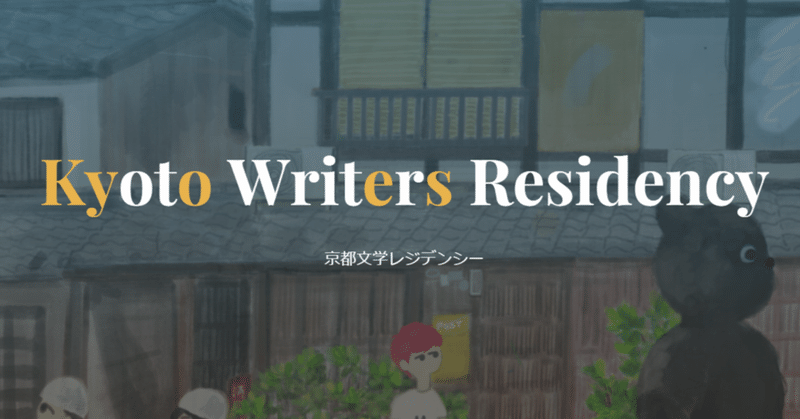
京都文学レジデンシー参加者①アルフィアン・サアット(Alfian Sa'at)
第一回京都文学レジデンシーの開催まで、いよいよ一週間を切りました。
10月1日から21日までの三週間、国内外の小説家・詩人・翻訳者6名が京都に集います。今回から、レジデンシー参加者の略歴や現在関わっているプロジェクトなどをお一人分ずつ紹介していきます。
ページの最後には参加者の小説やエッセイも、原文と日本語訳あわせて掲載していますので、ぜひご覧ください。
(京都文学レジデンシーやオープニング・フォーラムの詳細はこちら。フォーラム参加申込はこちら。)

アルフィアン・サアット(Alfian Sa'at)
プロフィール/Bio
劇作家、小説家、詩人。劇団WILD RICE(シンガポール)に座付劇作家として、数多くの戯曲を提供してきた。著書に、詩集"One Fierce Hour(激しいひと時)”、 ”A History of Amnesia(記憶喪失の歴史)”、”The Invisible Manuscript(透明な原稿)”のほか、短編小説集『サヤン、シンガポール』(幸節みゆき訳、段々社)、『マレー素描集』(藤井光訳、書肆侃侃房)、戯曲集などがある。
Alfian Sa’at is the Resident Playwright of Wild Rice. His published works include three collections of poetry: ”One Fierce Hour”, ”A History of Amnesia” and ”The Invisible Manuscript”; a collection of short stories, ‘Corridor’; a collection of flash fiction, ‘Malay Sketches’; and three collections of plays.
最近取り組んでいる作品やプロジェクトについて/Description of current projects
シンガポールの環境史と気候危機をテーマとした戯曲「プラウ・ウジョン - 終わりの島」を執筆中。移民エコロジープロジェクトのメンバーでもあり、 シンガポール・ビエンナーレ2022では、言語とエコロジーに関するエッセイ「木の中で話す」に基づいた作品を発表する予定。吉村昭『遠い日の戦争』や丸谷才一『笹まくら』など、戦争体験を基にした日本の作品に興味があり、レジデンシー滞在中に理解を深めたい。
He is currently working on a new play called "Pulau Ujong--Island at the End", which explores the environmental history of Singapore and the climate crisis. He is also part of the Migrant Ecologies Project group, which will present a work at the Singapore Biennale 2022 based on his essay on language and ecology called "Talking in Trees". For his residency, he is interested in war memory, in works such as Yoshimura Akira's "One Man's Justice" and Maruya Saiichi's "Grass for My Pillow".
(以下はアルフィアン・サアットさんの短篇小説。日本語訳のあとに、英語の原文を掲載しています。)
アルフィアン・サアット
「穴」
(藤井光訳)
お昼を食べ終わって少ししたころに、扉をノックする音がした。開けてみると、男がいて、礼儀正しく挨拶して封筒を渡してきた。二十四時間以内に遺体を引き取ってください、引き取り手のない場合は国による埋葬が行われます。俺はショックを受ける心境ではなかった。この一週間、それに対する心の準備をしてきた。封筒を受け取るときも、両手を震わせたりはしなかった。俺が受け取ろうとしている封筒にはなんの重みもないんだ、と自分に言い聞かせた。
男は思っていたよりも早く立ち去った。俺にひとりで悲しみを嚙みしめてもらおうと考えたのかと思うと気に食わなかった。悼むべきものなんかないことを、あの男はわかっていない。息子とはもう何年も口をきいていなかった。母親とはちがって、刑務所にいる息子に面会に行くこともなかった。その男がもうしばらくいたなら、俺は目の前で封筒を開けただろう。落ち着いて開封し、読み終えたら男をまっすぐ見つめて、ありがとうと言っただろう。
だが、俺が落ち着いて行動していると思ったとしたら、それは間違いだ。落ち着きとは、自分の感情をしっかりコントロールできていることだ。だが、さっきも言ったように、俺にはもう感情はなかった。落ち着きというよりも無感覚だった。俺はかなり前から、起きていることはすべて宿命の結果なのだと思うようにしていた。縄で吊るした人形のように俺の息子を捕らえているのも、これまた人形のように俺の両手を動かして封筒の端を破らせているのも、宿命のなせるわざなのだ。
封筒のなかには一通の手紙が入っていた。息子のピンク色の身分証もあった。俺は手紙を脇に置いて、身分証をじっと見つめた。そうか、死んだ男というのはこういう顔をしているわけだ。息子の目元には隈があった。どこかぼんやりした顔つきで、カメラのシャッターを切ってもらう準備ができていない表情だった。
そして、名前があった。
俺の名前も。息子の名前とは「ビン」の一言で隔てられている〔訳注 マレー人男性の名前は「本人の名+ビン+父親の名」が通例〕。
息子の人種の情報。
生年月日。
出生国。
裏には、身分証の番号。
俺たちの家の住所。
だが、なによりも目を奪われたのは、その身分証にひとつだけ開けられた小さな穴だった。その身分証はもう使用できないことを示すための穴だ。誰かにその手の身分証を見せるとなれば、親指と人差し指で穴をつまみ、キズ物を持っているとは誰にも悟られませんようにと祈ることになる。
ふと、息子がそうやって身分証を持ち、まだ生きている人間のふりをしようとする姿が目に浮かんだ。いかにも息子がつきそうな噓だ。想像のなかでそうしている息子は、あのひねくれた笑顔になっている。いつもあの笑顔を使って、俺たちを言いくるめていた。僕は変われるよ、ちゃんと話を聞いてるよ、すべてうまくいくからさ、と。俺は怒りを覚えた。
怒りの矛先は、その穴を開けた人間に向いた。クレジットカードを破棄するときに、大きなハサミで真っ二つに切っているのを見たことがある。どうしてこの身分証も切ってしまわないのか? どうして、あっさりしたきれいな穴を開けたのか? 酸の小さなしずくのような怒りが肌を焼き、肉を貫き、骨のなかにまで達するのがわかった。
息子はもういない。目の前に、ひと続きの輪、きれいな円がいくつも見える……遊び場の輪郭、俺たちの住む建物の下にある石のテーブル、息子の首を締めつける縄、まだ赤ん坊だった息子の口の形が、あの小さな穴に縮んでいく。その穴から、自分の体が一滴また一滴と漏れ出ていくのがわかる─いつの日か、その向こう側で、息子と一緒になるのだろう。
(『マレー素描集』書肆侃侃房より)

"The Hole"
Alfian Sa’at
It was a little after I had my lunch when I heard the knock at the door. When I opened it, a polite man greeted me and passed me an envelope. Please collect the body within 24 hours, or it will be cremated. There was no room for shock. The whole week I had prepared myself for this. I did not let my hands tremble as I accepted the envelope. I told myself I was receiving something that was weightless.
The man left earlier than I expected. I did not like the idea that he felt it was only proper to leave me to grieve in private. He did not understand that there was no grief. My son and I had not spoken to each other for many years. Unlike his mother, I had refused to visit him in prison. I would have opened the envelope right in front of the man if he had stayed. I would have done it calmly, and when I am done, I will look at him straight in the eyes and say thank you.
But the man would be mistaken if he had thought my actions were calm. Because calmness meant that I was placing my feelings under control. But as I have said, I had no more feelings anymore. It was not calmness, but numbness. Very early on I had decided that everything that was happening was as a result of fate. It was fate that would hold my son up like a puppet from a rope, and it was also fate that would move my hands, also like a puppet, to tear the edge of an envelope.
Inside the envelope was a letter. There was also my son’s pink identity card. I put the letter to one side and stared hard at the I/C. So this was what a dead man looked like. There were shadows under his eyes. There was something far away in his expression, a face not prepared for the snap of the camera.
There was his name.
My name also. Separated from his by the word ‘Bin’.
His race.
Date of birth.
Country of birth.
On the back, his I/C number.
Our home address.
But what absorbed me the most was a little hole that had been punched in his I/C. It was there to say that the I/C could no longer be used. To show someone an I/C like this, you would have to place your finger and thumb over the hole, praying that nobody would notice that you are holding something that has been damaged. I suddenly saw my son holding the I/C in this way, trying to pass himself off as someone who was still alive. It was just the sort of lying thing that I could expect from him. I imagined him doing it with that crooked smile on his face, the smile he always used to convince us that he would change, that he was listening, that everything would turn out all right. And I became angry.
My anger turned towards the person who had punched the hole. I had seen the way a credit card is destroyed, with a big pair of scissors slicing it into two halves. Why couldn’t they do the same with this I/C? Why this clean, straightforward hole? I felt my anger burn, first on my skin, through the flesh, like a droplet of acid, right into my bones. My son was no more. I saw a series of circles, perfect circles…the outline of a playground, the stone table under our block, the noose tightening around his neck, the shape of his mouth when he was still a baby, shrinking to the size of the hole. It is an opening through which I feel my body leaking, drop by drop, until the day I join my son on the other side.
(From "Malay Sketches" Ethos Books)
【京都文学レジデンシー事業の支援のお願い→こちら】
この記事が気に入ったらサポートをしてみませんか?
